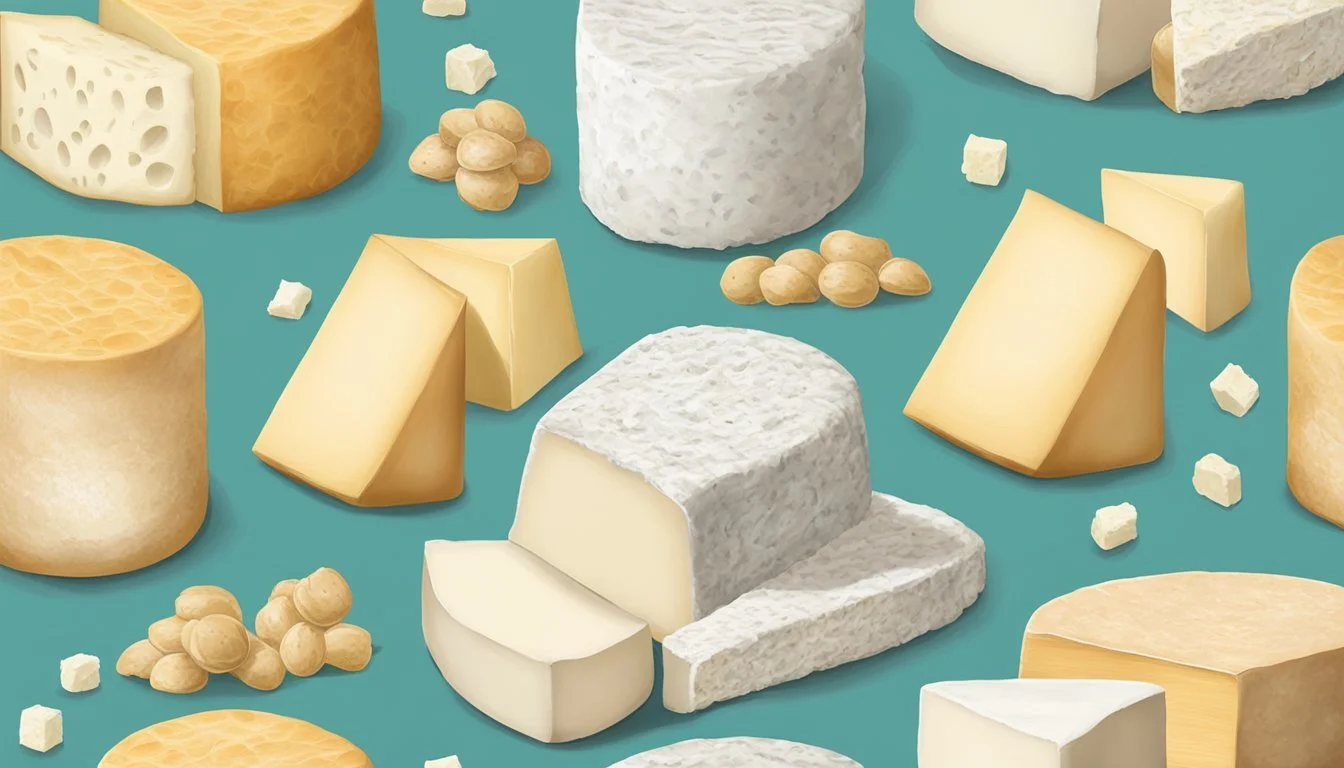Can Pregnant Women Consume Goat Cheese?
Safety and Guidelines Explained
Pregnant women often navigate a complex list of dietary dos and don'ts, and when it comes to cheeses, the rules can be particularly confusing. Goat cheese is a type of cheese that has garnered specific attention due to its varied preparation methods. While some varieties of goat cheese are deemed unsafe for pregnant women due to the risk of foodborne illness, not all goat cheese is off-limits. The key factor that determines the safety of goat cheese during pregnancy is whether it has been made with pasteurized milk.
Hard goat cheeses, as well as soft goat cheeses that are clearly labeled as "pasteurized," are considered safe for pregnant women. The pasteurization process involves heating the milk to a temperature that is sufficient to kill off any harmful bacteria, including Listeria, which can cause serious infection in pregnant women and lead to complications. Moreover, pasteurized goat cheese can be a nutritious addition to a pregnant woman's diet, providing essential nutrients like calcium and protein that are crucial for the baby's development.
However, pregnant women are advised to avoid unpasteurized goat cheese and any soft cheese that has a higher moisture content, as these can harbor bacteria and present a greater risk of foodborne illnesses. It is also recommended that if consuming goat cheese while pregnant, women should ensure it's thoroughly cooked until steaming hot, which further reduces the risk of contamination. Careful selection and preparation of goat cheese can therefore allow pregnant women to include this versatile ingredient in their diets safely.
Safety of Goat Cheese in Pregnancy
When pregnant, it is crucial to consider the safety of consuming products like goat cheese, which may carry risks such as listeriosis if not properly pasteurized or handled.
Understanding Pasteurization
Pasteurization is a process that heats milk to a specific temperature for a set amount of time to kill harmful bacteria, including Listeria monocytogenes. Pregnant women are advised to consume only pasteurized milk products because the immune system is more susceptible to infections during pregnancy. Raw milk cheeses are higher risk, as they bypass this critical safety step.
Identifying Pasteurized Cheese
To ensure a cheese is safe to eat during pregnancy, one should look for labels that specifically state "pasteurized milk." It's important to avoid cheeses made from raw milk. Many stores and producers clearly label their cheese as pasteurized or unpasteurized. If the label is unclear or absent, pregnant women should opt to avoid those products.
Risks of Listeria Monocytogenes
Listeria monocytogenes is a bacterium that can cause listeriosis, a serious infection particularly dangerous during pregnancy. It can thrive in softer, moisture-rich cheeses but is less commonly found in hard, aged cheeses. While pasteurization significantly reduces the risk of Listeria contamination, cross-contamination can also occur, hence the recommendation for pregnant women to exercise caution with cheeses, especially the soft cheese varieties.
Health Benefits of Consuming Goat Cheese in Pregnancy
When considering goat cheese during pregnancy, it's important to look at its nutritional profile and the specific benefits it can provide. Pregnant women might find goat cheese a worthwhile addition to their diet due to its substantial nutrient content and contribution to necessary dietary components like calcium and protein.
Nutritional Value of Goat Cheese
Goat cheese is a rich source of essential nutrients beneficial for both the mother and the developing fetus. It boasts a high content of vital minerals and vitamins, which are integral to a healthy pregnancy.
Vitamins: It contains important vitamins such as Vitamin A, which supports immune system function, and Vitamin B2 (riboflavin), crucial for energy production.
Minerals: A variety of minerals are present, including:
Calcium: Essential for building strong bones and teeth in the developing fetus.
Phosphorus: Works in tandem with calcium for bone health.
Zinc: Supports fetal growth and immune function.
Protein: Offers a high-quality protein source, crucial for the growth and repair of tissues.
Fiber: Although not abundant, it contributes to a healthy digestive system.
Importantly, goat cheese is generally easier to digest due to its lower lactose content and a different protein structure compared to cow's milk, which can be beneficial for those with sensitivities.
Role of Calcium and Protein in Pregnancy
Calcium plays a pivotal role in pregnancy for the development of the fetus's skeletal system. Pregnant women need adequate calcium to ensure their bone density remains intact while supplying the fetus.
Calcium Needs: The recommended dietary allowance (RDA) for pregnant women aged 19-50 is 1,000 mg/day.
Protein is equally important since it serves as one of the building blocks of fetal tissue and supports the mother's body in adapting to pregnancy.
Protein Requirements: Pregnant women generally require about 71 grams of protein per day.
Goat cheese can contribute significantly to meeting these nutritional needs when included as part of a balanced diet. It's critical, however, to ensure that the goat cheese consumed is made from pasteurized milk to reduce the risk of foodborne illnesses, which are a concern during pregnancy.
Types of Goat Cheese and Their Pregnancy Suitability
Pregnancy necessitates careful consideration when it comes to consuming cheese, especially when distinguishing between types of goat cheese. The key concern is the pasteurization process and the moisture content, which together determine safety for pregnant women.
Soft Versus Hard Goat Cheese
Soft goat cheeses are typically higher in moisture and, if made from unpasteurized milk, may harbor bacteria harmful to pregnant women. To ensure safety, they must avoid soft, mold-ripened cheeses unless they are made from pasteurized milk. Hard goat cheeses, on the other hand, contain less moisture which inhibits bacterial growth. They are generally considered safe for consumption during pregnancy, regardless of whether they are made from pasteurized or unpasteurized milk.
Examples of Safe Goat Cheeses
For pregnant women looking to enjoy goat cheese, here are specific examples that have been deemed safe:
Hard Goat Cheese: Such as goat's Gouda which is firm and has a hard rind.
Pasteurized Goat Cheese: Soft goat cheeses that have undergone pasteurization to eliminate bacteria.
By choosing these types of goat cheese, pregnant women can minimize their food poisoning risk while still enjoying a variety of flavors and textures.
Incorporating Goat Cheese into a Pregnancy Diet
Pregnant women can enjoy the benefits of goat cheese as part of a balanced diet. It is important to choose pasteurized varieties to ensure safety from bacteria harmful during pregnancy.
Healthy Recipes with Goat Cheese
Pregnant women can incorporate pasteurized goat cheese into various healthy recipes. A salad with fresh greens, nuts, sliced fruits, and crumbled goat cheese provides a nutritious and refreshing meal. Additionally, whole grain crackers topped with a slice of goat gouda serve as a wholesome snack. For a more substantial dish, one can prepare an omelet with goat cheese, vegetables, and herbs.
Salad with Goat Cheese:
Mixed greens, a handful of walnuts, slices of apple or pear, crumbled goat cheese.
Dressing: Olive oil, balsamic vinegar, a pinch of salt and black pepper.
Goat Cheese Omelet:
2 eggs, spinach, tomatoes, a sprinkle of goat gouda, herbs.
Method: Cook the vegetables lightly, add beaten eggs, and top with cheese before folding.
Goat Cheese as a Protein Source
Goat cheese is a valuable source of protein for pregnant women. Incorporating goat cheese into snacks or meals can help meet the daily protein requirements essential for fetal development. Goat gouda and feta cheese made from pasteurized milk are healthy options. These cheeses can be added to a homemade pizza with a variety of toppings for a protein-rich meal.
Homemade Pizza with Goat Cheese:
Base: Whole grain pizza dough.
Toppings: Tomato sauce, pasteurized goat cheese or feta, spinach, grilled chicken (optional), a drizzle of olive oil after baking.
Avoiding High-Risk Foods
To ensure safety, pregnant women should avoid high-risk foods like unpasteurized cheeses, including certain types of blue cheese, brie, and camembert. Non-pasteurized products can contain listeria, a bacterium that poses a significant health risk during pregnancy. Hard cheeses such as cheddar and parmesan, when pasteurized, are typically considered safe. Always check the cheese label to confirm it is pasteurized and avoid deli counters where cross-contamination risk is higher.
Safe Cheese Choices:
Hard cheeses: Pasteurized cheddar, parmesan.
Soft cheeses: Avoid unpasteurized brie and camembert.
Always confirm pasteurization on the label.
Reading and Understanding Food Labels
When shopping for goat cheese during pregnancy, reading food labels is critical to ensure safety and quality. They are not just a source of nutritional information, but also provide essential details about the cheese's pasteurization status.
Identifying Pasteurized Goat Cheese on Labels
It is imperative to look for specific wording on cheese labels indicating pasteurization. Labels may state:
"Made from pasteurized milk"
"Pasteurized cheese"
These terms ensure that the goat cheese underwent a process that eliminated harmful bacteria, making it safe for consumption during pregnancy. Cheese made from unpasteurized milk is best avoided as it can harbor Listeria monocytogenes, a bacterium dangerous for pregnant women.
Importance of Label Information
The information on a food label serves as a guide to:
Food Safety: Labels confirm that the cheese meets health standards for consumption during pregnancy.
Quality Control: They also ensure that consumers are purchasing and consuming products that are handled and processed safely.
Labels provide detailed product information enabling pregnant women to make informed decisions about the foods they consume, which directly affects the health of their developing babies. Remember to always check for the pasteurization status of goat cheese when shopping to ensure it is suitable for pregnancy.
Potential Risks and Complications
Consuming goat cheese during pregnancy can come with certain health risks due to the possibility of foodborne illnesses. Pregnant women need to be aware of the hazards associated with unpasteurized dairy products.
Foodborne Illnesses During Pregnancy
Listeriosis is a key concern for pregnant women when considering the consumption of goat cheese. Listeria monocytogenes, the bacterium responsible for listeriosis, can lead to severe complications including miscarriage, premature birth, and even stillbirth. Symptoms may resemble the flu, such as fever and muscle aches, and can escalate to meningitis if the central nervous system is affected. Other foodborne pathogens that can be present in unpasteurized cheese are Salmonella and E. coli, which can cause significant health issues for both the mother and fetus, including dehydration, blood infection, and potentially severe gastrointestinal illness.
Listeria risks: Miscarriage, stillbirth, premature delivery, blood infection, meningitis.
Other pathogens: Salmonella, E. coli leading to dehydration, and severe gastroenteritis.
Preventing Listeriosis and Other Infections
To prevent listeriosis and other infections like those caused by Salmonella or E. coli, pregnant women should only consume goat cheese made from pasteurized milk. Pasteurization effectively kills harmful bacteria. Pregnant women should also avoid cross-contamination by keeping unpasteurized cheeses separate and using clean utensils.
Safety measures:
Only consume goat cheese made from pasteurized milk.
Avoid cross-contamination with careful kitchen hygiene.
Government Guidelines and Recommendations
The U.S. Food and Drug Administration (FDA) and the Centers for Disease Control and Prevention (CDC) have set guidelines concerning the consumption of dairy products, including goat cheese, during pregnancy. These organizations stress the importance of food safety and recommend that pregnant women only consume dairy products that have been pasteurized.
Cheese and Pasteurization
FDA recommends that any soft cheese should be made from pasteurized milk.
They warn against consuming mold-ripened cheese, like certain variants of goat cheese, unless they are clearly labeled as made from pasteurized milk.
Listeriosis Prevention
CDC emphasizes the importance of avoiding listeriosis, a foodborne illness, by recommending that pregnant women avoid soft cheeses that have not been made with pasteurized milk.
Cooking Cheese to Safe Temperatures
If a pregnant woman chooses to consume cheese of uncertain pasteurization status, the FDA and CDC advise cooking the cheese until it reaches an internal temperature of 165°F, which kills harmful bacteria.
Cheese Storage
The FDA also provides guidance on proper storage of cheese to minimize bacterial growth, advising that cheese be refrigerated at 40°F or below and consumed promptly after opening.
Recognizing Safe Products
The FDA encourages consumers to read labels carefully for indications of pasteurization and to consult with healthcare providers regarding the consumption of different cheese types during pregnancy.
Conclusion
Pregnant women often receive conflicting advice about cheese consumption. However, goat cheese presents a unique profile that can contribute positively to pregnant women's diets when consumed correctly.
Benefits of Goat Cheese
Goat cheese is a good source of calcium and provides essential protein required during pregnancy. Its easier digestibility compared to cow's milk cheese makes it a suitable choice for some women experiencing gastrointestinal discomfort common in pregnancy.
Nutritional Value
High in Protein: Serves as an important building block for fetal development.
Calcium-Rich: Vital for bone development of the growing fetus.
Weight Gain
Goat cheese has a relatively high caloric density, so moderation is key. It can be included as part of a healthy diet, but portions should be controlled to avoid excessive weight gain.
Food Safety
To minimize the risk of foodborne illnesses, such as listeriosis, it is essential for pregnant women to choose pasteurized goat cheese. The pasteurization process eliminates harmful bacteria, making it safer for consumption during pregnancy.
Allergic Reactions
While goat cheese is less allergenic than cow's milk cheese, there is still a possibility for allergic reactions. Pregnant women not previously allergenic should proceed without concern, yet those with known allergies or sensitivities should consult with a healthcare provider.
In light of these considerations, pasteurized goat cheese can be a nutritious part of a pregnancy diet, provided it is introduced with care and attention to food safety and nutritional balance.






